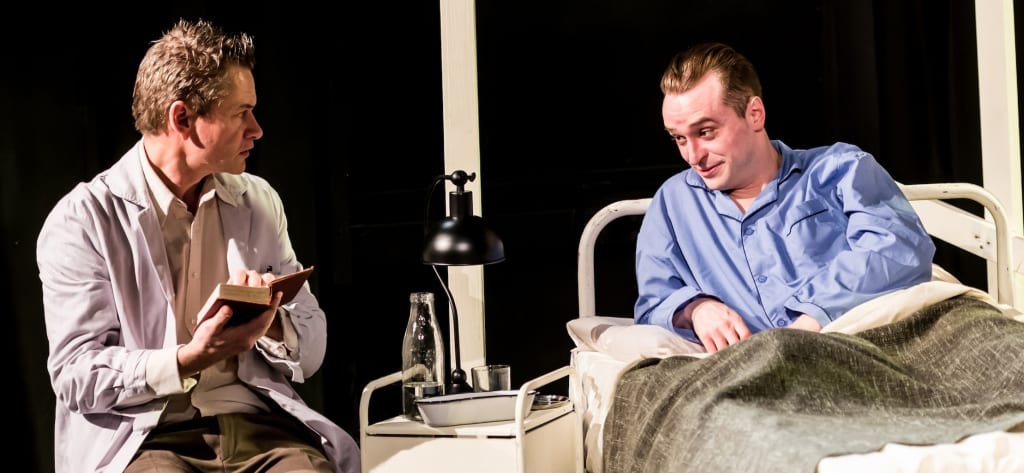The Omnibus is a welcoming 90-seater space housed in a former library, with a bright, cheerful bar and a resident feline to distract you on your way to take your seat. Within, a hospital bed and its patient are already on the stage in the semi-blackout framed by an abstract, white, slatted set. A naked man appears, irons all his clothes before putting them on, and then we begin a fascinating dialogue between Ludwig Wittgenstein, philosopher, and John Smith, Cockney navvy, inspired by the time Wittgenstein spent as a porter in Guy’s Hospital during World War Two.
A number of themes and issues, both high and low, are run through this play at the same time, just as with Mrs Orwell, the study of Orwell’s last months, recently showing at The Old Red Lion. We have a chance to experience a purely human story of compassion and growing understanding between two men who on the face of it would appear to have little in common. But interwoven with it is a subtle and playful examination of how Wittgenstein’s ‘second’ philosophy of language, later published as Philosophical Investigations, emerged from discontent with his original theory in Tractatus Logico-Philosophicus. Here the key insight into language games and the imprecise, improvisatory nature of words is provided by the interchanges with John, whose Cockney dialect and gradual emergence from illiteracy under Ludwig’s tutelage, provide the philosopher with an object lesson in what he has been seeking intellectually and missing emotionally.
But the great pleasure of Ron Elisha’s finely wrought play is that you can juggle with both these perspectives or simply enjoy the interplay between the two characters oblivious of the deeper issues in the shadows. This is a tribute to the skill of the two actors depicting the characters and the evident rapport between them. Richard Stemp captures what we know of the philosopher’s bearing with precision: the military sharpness, the clipped diction, the earnest but not humourless focus on serious issues, and the shy compassion waiting to be released. In contrast, Ben Woodhall finds John’s largeness of heart, full-on embrace of life (despite his illness), and his eagerness to learn and make the most of things when given the opportunity. Though bed-bound, he has a quiet persistent skill to draw the audience into his humour and vulnerability just as much as he finally breaks through the philosopher’s stiff and shy reserve.
At eighty-five minutes straight through, this play is just the right length, allowing the encounter to run its natural course, without in any way overstaying its welcome. The set and props give sufficient detail to provide a legible hospital context while leaving nothing over-fussy. An eloquent soundtrack drawn from Schubert’s Second Piano Trio accentuates and commentates on the emotions evoked in each scene with an unerring poise and calculated effect; and a mostly subdued lighting scheme, reflecting the wartime blackout at night, captures the earnest, whispered tones of much of the discussion.
There is no escaping from the fact, though, that this play is defined by the reach and limits of language. On the one hand the joy and creativity of reading and writing is evoked afresh through Tolstoy and Dickens, while on the other we are reminded of how much of what matters most in life lies beyond language, and that much of the skill in living well is in knowing where one should shade and slip into the other. The most magical moments are when the two actors hover on the edge of those boundaries.
Many new plays come to their first full audience showing under-prepared, still needing further time in the work shop. This one, however, has been carefully honed by author, director and players so that both humour and pathos and high-level argument are well balanced and interlaced. A transfer to the West End would be deserved, and one hopes that a space such as Trafalgar Studio 2 might be available which would preserve the intimacy and intensity of this excellent play while revealing it to a wider cosmopolitan audience.

